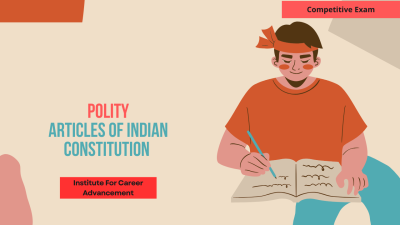Indian Polity
Indian Polity is the study of the political system of India. It primarily revolves around the Constitution of India, which is the supreme law of the land. This vast document outlines the framework of the Indian government, its structure, powers, and functions. Key aspects of Indian Polity: Federalism: India is a federation, with power divided between the central government and state governments. Parliamentary System: India follows a parliamentary system where the executive is responsible to the legislature. Secularism: The state guarantees religious freedom and neutrality. Socialism: The Constitution aims for a socialist society, ensuring economic and social justice. Democracy: India is a democratic republic, where power rests with the people. Fundamental Rights and Duties: These are the basic human rights and responsibilities of citizens. Directive Principles of State Policy: These are guidelines for the government to strive for. In essence, Indian Polity is a deep dive into the structure and functioning of the world's largest democracy. It covers topics ranging from the President and Prime Minister to the judiciary, elections, and federalism. ভারতীয় রাজনীতি হল ভারতের রাজনৈতিক ব্যবস্থার অধ্যয়ন। এটি মূলত ভারতের সংবিধানকে ঘিরে আবর্তিত, যা দেশের সর্বোচ্চ আইন। এই বিশাল নথিতে ভারত সরকারের কাঠামো, এর কাঠামো, ক্ষমতা এবং কার্যাবলীর রূপরেখা দেওয়া হয়েছে। ভারতীয় রাজনীতির প্রধান দিকগুলিঃ যুক্তরাষ্ট্রীয়তাঃ ভারত একটি যুক্তরাষ্ট্রীয় রাষ্ট্র, যার ক্ষমতা কেন্দ্রীয় সরকার এবং রাজ্য সরকারের মধ্যে বিভক্ত। সংসদীয় ব্যবস্থাঃ ভারত একটি সংসদীয় ব্যবস্থা অনুসরণ করে যেখানে কার্যনির্বাহী আইনসভার কাছে দায়বদ্ধ। ধর্মনিরপেক্ষতাঃ রাষ্ট্র ধর্মীয় স্বাধীনতা এবং নিরপেক্ষতার নিশ্চয়তা দেয়। সমাজতন্ত্রঃ সংবিধানের লক্ষ্য হল একটি সমাজতান্ত্রিক সমাজ, যা অর্থনৈতিক ও সামাজিক ন্যায়বিচার নিশ্চিত করে। গণতন্ত্রঃ ভারত একটি গণতান্ত্রিক প্রজাতন্ত্র, যেখানে ক্ষমতা জনগণের হাতে থাকে। মৌলিক অধিকার ও কর্তব্যঃ এগুলি নাগরিকদের মৌলিক মানবাধিকার ও দায়িত্ব। রাজ্য নীতির নির্দেশমূলক নীতিঃ এগুলি সরকারের জন্য প্রচেষ্টা করার জন্য নির্দেশিকা। সংক্ষেপে, ভারতীয় রাজনীতি হল বিশ্বের বৃহত্তম গণতন্ত্রের কাঠামো এবং কার্যকারিতার একটি গভীর ডুব। এতে রাষ্ট্রপতি ও প্রধানমন্ত্রী থেকে শুরু করে বিচার বিভাগ, নির্বাচন এবং যুক্তরাষ্ট্রীয় ব্যবস্থা পর্যন্ত বিভিন্ন বিষয় অন্তর্ভুক্ত রয়েছে।
English
Last updated
Sat, 14-Jun-2025




















